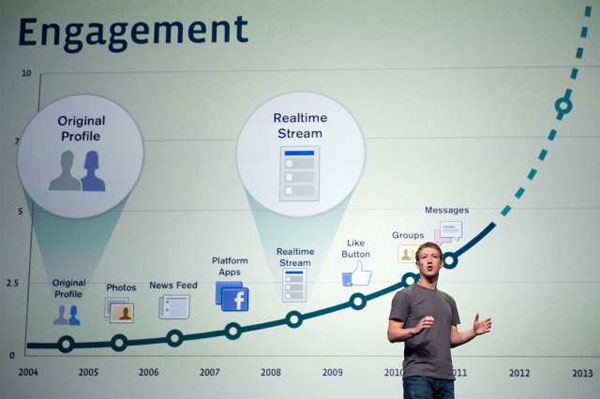
“With Open Graph this next wave of companies understand that if you can help people discover an order of magnitude more content than before, that enables a whole wave of new models,” he said. “We’re not just rethinking the experience of watching content with friends, but we are rethinking entire industries.” – Mark Zuckerberg, f8 Keynote
In his announcement at f8 last Thursday, Mark Zuckerberg announced a pivot in how Facebook will behave and be displayed via the News Stream and the new Ticker. The new Open Graph Protocol moves beyond generic “Likes” to a specific range of content consumption actions such as “Watch,” “Read,” “Cook,” “Run,” etc. Marketers managing brand pages on Facebook will need to think more deeply in terms of providing content experiences to engage with customers.
Over, the past 5 days, numerous articles appeared about how the new Facebook will affect brands and Facebook pages. Below are some of the quotes and articles I found most insightful:
What Facebook’s Changes Mean for Marketers – Todd Wasserman, Mashable
The change will require new thinking from marketers who had merely tried to accumulate as many fans and “Likes” as possible. Jenna Lebel, managing director of strategy at Likeable Media, says the “Like” is “a little less relevant now,” and that marketers will have to work harder to earn their place in news feeds. “Your content is going to need to be absolutely amazing,” she says.
Colin Murphy, social media director at Skinny, a digital ad agency, thinks overall, the changes are a challenge to marketers and agencies. “He really threw down the gauntlet today,” Murphy says of Mark Zuckerberg. “You actually have to deliver something of value to a customer rather than just being a person spamming.”
Facebook and its followers, LA Times Editorial
For media companies, meanwhile, Facebook’s move means that millions of people could start alerting their friends about the songs, shows and other content they consume online. But if those friends can’t play any of that material, the value of that promotion will evaporate; instead, they’ll gravitate toward content they can play. The pressure will thus grow on media companies to make more content available online, and to make at least some of it available for free. That’s not necessarily the direction the movie studios, publishers and other content providers want to go. But if Facebook leads half a billion people down that road, media companies may have to follow.
Why Facebook’s Timeline Might Be Bad News For Brands – Ciarán Norris, search engine land
But for brands who don’t make this type of content, these developments could make it much harder to use Facebook to engage with consumers. Firstly, if Facebook becomes the place where people actually consume content, rather than acting as a gateway to that content, it’s simply going to be harder to stand out from the crowd. If I’m on Facebook watching a movie, or reading an article, why would I want to engage with a branded app, unless it’s absolutely amazing, and really adds something to my digital life? To a certain extent, this is already true: bad apps sink, good apps don’t. But when you add the new content structure into (Timeline & the ticker) the mix, this is only going to become even more true.
How Facebook Timeline Might Radically Change the Look of Brand Pages [PICS] – Todd Wasserman, Mashable
Facebook hasn’t said anything specific about how the likes of Coca-Cola or McDonald’s might take advantage of the new design, though it looks like those, too, will change radically. “Consistency in both functionality and appearance is really important to Facebook,” a Facebook rep tells Mashable, “so we hope to make Pages more consistent with the new Timeline in the future.”
How Small Businesses Can Stay Ahead of the Facebook Changes – Chris Syme, Social MEdia Today
Organic growth is a dream of the past. You can no longer afford to nurture your fans along like seedlings, feeding them engaging bits of user polls, asking for their comments, posting links to pieces you think might interest them in hopes they will pass them along. Small businesses that rely solely on organic growth (your fan numbers growing naturally) may fail in the new system. Identify key influencers in your fan base and begin to learn how to use them (and reward them) for amplifying your messages. If you don’t want to put the time in to learn how to grow your numbers purposefully using the changes, you may want to downgrade Facebook’s importance in your online marketing plan.
Why Is Facebook Punishing Highly Engaging Brands? – Nick Vivion, All Facebook.com
The new Facebook news feed has practically erased from users’ homepages all brands that don’t buy advertising. Check it out for yourself: Scroll through all of the posts on your feed. Do you see any brand posts? Most likely, you will not see one single post from any brand you’ve liked — even a brand that you have interacted with regularly over the past 18 months! Facebook has apparently decided that any brand relationship –- engaging or not, regardless of your past behavior – is not desirable in the news feed.
Facebook as Tastemaker – Somini Sengupta and Ben Sisario, NY Times
Facebook executives describe their efforts as upending the traditional model of marketing. Rather than just helping people buy what they need, they aim to curate what they might want.
Takeaways:
1. Brand pages will need to develop engaging content experiences in order to show up in the news feeds/timelines of their customers. For experienced interactive content creators, this is an exciting step forward.
2. Small businesses are going to have to invest in Facebook Advertising to get noticed or downplay the importance of Facebook. This problem could be why Facebook recently announced that they are awarding all small businesses a $50 advertising credit to get in the game.
3. Facebook has transitioned from a social network to a 21st century online media platform.
Do you have any articles on the new Facebook you’d like to share? Comment below.
